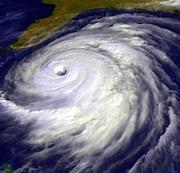Does the Public Take Hurricanes With Female Names Less Seriously?
Posted on Jun 05, 2014 | Comments 0
 A new study led by researchers at the University of Illinois examined the death toll from Atlantic hurricanes that made landfall from 1950 to 2012. The data showed that the death toll from hurricanes with feminine names was on average three times as great as hurricanes with male names. (Until the late 1970s only feminine names were used. Now storms are named with alternating masculine and feminine names.) But if the data used is only since the change to both masculine and feminine names, storms with feminine names still have had a death toll that averages three times as many as the death toll for hurricanes with male names. (Hurricanes Katrina in 2005 and Audrey in 1958 were excluded because of huge death tolls so the gender discrepancy would be even higher if they were included.)
A new study led by researchers at the University of Illinois examined the death toll from Atlantic hurricanes that made landfall from 1950 to 2012. The data showed that the death toll from hurricanes with feminine names was on average three times as great as hurricanes with male names. (Until the late 1970s only feminine names were used. Now storms are named with alternating masculine and feminine names.) But if the data used is only since the change to both masculine and feminine names, storms with feminine names still have had a death toll that averages three times as many as the death toll for hurricanes with male names. (Hurricanes Katrina in 2005 and Audrey in 1958 were excluded because of huge death tolls so the gender discrepancy would be even higher if they were included.)
The authors believe that the general public takes storms with feminine names less seriously, believing that they will cause less damage and risk to life. The unconscious bias, the authors believe, leads to the public taking less precaution when a storm has a feminine name. The authors conducted several experiments with colleges students who told investigators that they would be less likely to evacuate if a storm was named Christina but would be more likely to evacuate when told that Hurricane Christopher was on the way.
The study has many critics and has been met with skepticism in many quarters of the scientific community. Here is a summary of the criticism. But the study was published on the website of the Proceedings of the National Academy of Sciences. It may be accessed here.
Filed Under: Research/Study








